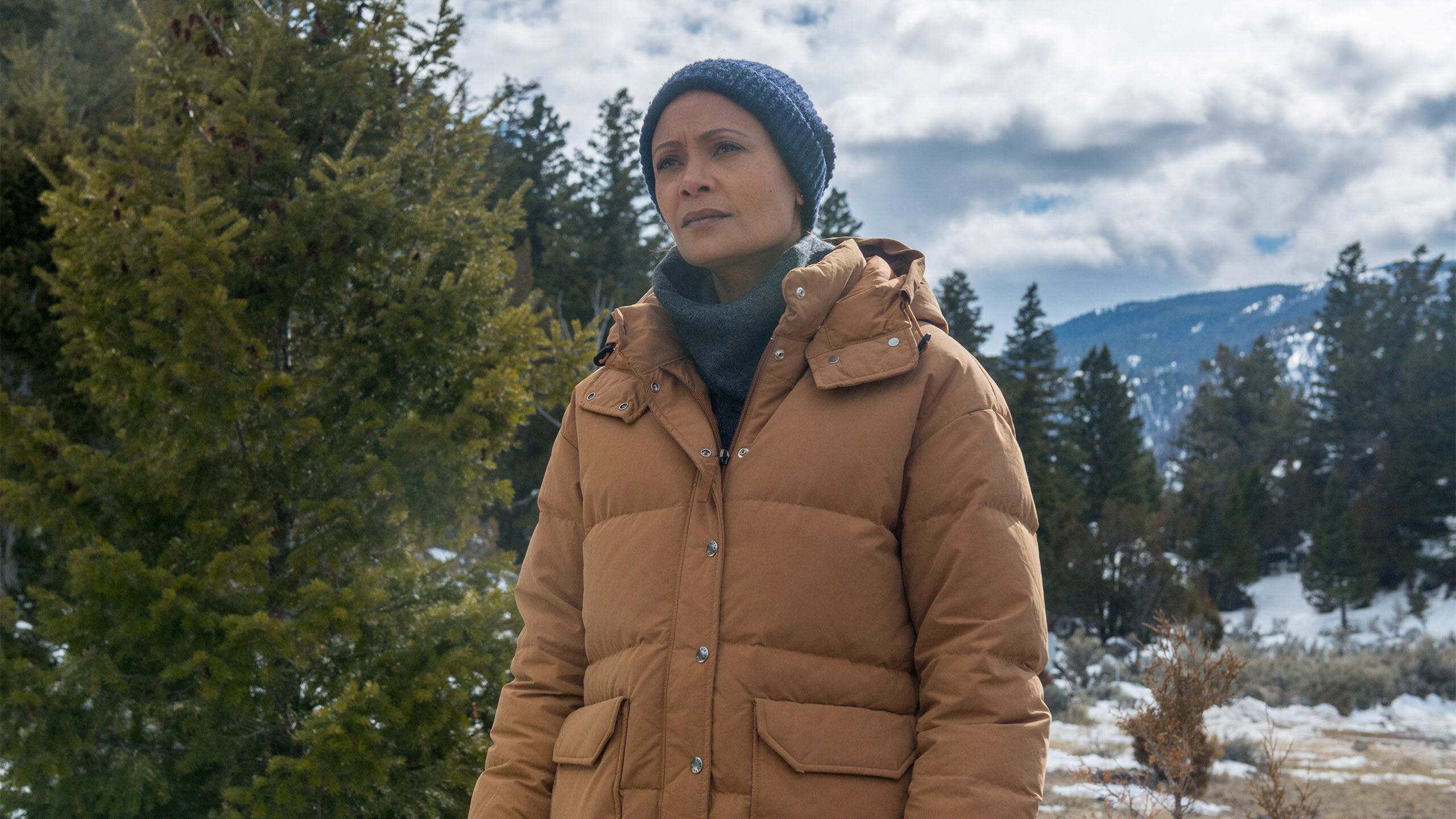GOD’S COUNTRY
*** A century of Westerns have relied on land squabbles—and in the West of 2022, you have to watch where you park. That’s what starts the trouble between Sandra Guidry (Thandiwe Newton), a college professor living in a remote canyon home after her mother’s death, and the deer hunters who want to use her driveway. One of God’s Country’s great strengths is how far and wide it escalates this elemental conflict. Most of the film’s complexity comes from director Julian Higgins and co-writer Shaye Ogbonna adapting the original James Lee Burke short story to center on a Black woman largely alone in the snowy remoteness. Still, some of the resulting ideological struggles feel more grafted on than organic. As Sandra fights for her safety, God’s Country becomes a cascading polemic, expositorily touching on #MeToo, diversity in academia, police violence, and recent American history in ways that sometimes drown out her character. Fortunately, the ideas can’t drown out Newton. You’ve never seen the Westworld star given the chance to show such versatility: Sandra is vulnerable, grieving, inspiring, caretaking, self-sabotaging and hard-bitten as frozen earth. With a nod to Do the Right Thing, this is one of the few modern Westerns that becomes something new while invoking age-old American conflicts. R. CHANCE SOLEM-PFEIFER. Cinema 21, Clackamas, Progress Ridge, Vancouver Mall.
FLUX GOURMET
** Peter Strickland (In Fabric) makes the kind of art-horror films that can experiment their way right out of the genre. Make no mistake, terrifying corporeal experiences abound in Flux Gourmet and its invention of a hybrid gastro-audio arts residency, but fear and suspense are nearly totally absent. Instead, the film becomes an arena for bizarro creativity and the reflexive mocking of bizarro creativity, as an avant-garde band (Asa Butterfield, Ariane Labed and Fatma Mohamed) bicker among themselves and with their residency host (Gwendoline Christie) about their performance art (which employs stove tops, blenders and so many soupy drips as the source of industrial music). It’s an absurdly original premise that eventually lands in the discordant, empty space between black comedy and body horror (imagine an awkward Yorgos Lanthimos-Gaspar Noé collaboration). Certain moments are so bluntly weird they elicit involuntary laughs, most of them due to Christie’s oversized bows and sleeping caps. But the movie so thoroughly takes the piss out of its own high-art pretension that there’s not much left to care about, save for some committed cringe work and lingering curiosity about how the hell Strickland came up with this. NR. CHANCE SOLEM-PFEIFER. Shudder.
LOVING HIGHSMITH
** Patricia Highsmith may have invented Tom Ripley and Strangers on a Train, but she opens this documentary espousing no love for mysteries. Fitting, maybe. Portrayed here, hers was a lifetime of intermittent hope (see: Carol) and overriding tragedy (see: everything else) as she lived out the loneliness, globe-trotting and crippling sexual repression so often found in her novels. With Gwendoline Christie narrating Highsmith’s diary pages and romantic letters in a voice like dry vermouth, we’re immersed in the author’s unrequited longing, most of all for her cruel mother’s affection (and for one great love whose identity remains a secret). Director Eva Vitija clearly devoted tremendous effort to interviewing and researching Highsmith’s romantic partners, but she lacks the footage necessary to provide narrative fuel. The film inexplicably overemphasizes Highsmith’s alienation using Texas rodeo B-roll, and Vitija’s sudden yet sparse first-person narration comes off as a last-ditch device to move us through the author’s biography. An interview with a Highsmith scholar or two could have added artistic insight without sacrificing intimacy, but instead Loving Highsmith paints itself into a melancholy corner. It fails to understand that while Highsmith’s life was sad, it was full. NR. CHANCE SOLEM-PFEIFER. Living Room.
SEE HOW THEY RUN
** Director Tom George and writer Mark Chappell indulge in meta mystery in this film noir, leaning primarily on established tropes (and almost getting away with it). The story begins in 1953 with a murder at an after-show party celebrating the 100th performance of Agatha Christie’s The Mousetrap. The victim, a brash American director named Leo Köpernick (Adrien Brody), had been commissioned to adapt the play for the screen—and apparently rubbed the wrong people the wrong way. Leo’s murder leads to the introduction of an enigmatic collection of suspects, who are investigated by a weary veteran inspector named Stoppard (Sam Rockwell) and his overzealous rookie partner, Constable Stalker (Saoirse Ronan). Stoppard takes the lead on the case, but Rockwell takes a noticeable backseat to Ronan in the film, delivering a performance that can’t match his charismatic turns in hits like Three Billboards. Luckily, Chapell’s script is laden with clever callbacks that come into play during the final reveal, and Stalker’s earnestness wonderfully plays off the cynicism of the people around her. This is Ronan’s movie, and she knocks it out the park, even if she gets regrettably (and surprisingly) little help from Rockwell. PG-13. RAY GILL JR. Cedar Hills, Eastport, Evergreen Parkway, Fox Tower, Living Room, Tigard.

